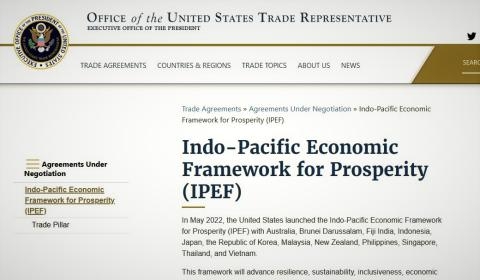
As international negotiators work out the details of the Indo-Pacific Economic Framework, key victories in the Digital Trade sphere of negotiations have already been achieved.
The following article was published in the May-June 2024 issue of NewsNotes.
Out of the limelight of public awareness, a deal is being forged right now between the United States and thirteen other major economies in the Indo-Pacific that would cover 28% of all global goods and services trade and 40% of global gross production.
The Indo-Pacific Economic Framework for Prosperity (IPEF) was launched on May 23, 2022, by the Biden Administration. The “framework” sets up the basis for trade negotiations in the Indo-Pacific region, covering such topics as digital trade and e-commerce, mineral supply chains, carbon removal and methane regulations, and tax enforcement information sharing and anticorruption enforcement. It is an ambitious and comprehensive deal that will shape the future of the Indo-Pacific region.
While negotiations have been conducted in secret, one revelation to the public so far has been very encouraging.
In April of 2023, Maryknoll Office for Global Concerns and over twenty other faith groups wrote to the U.S. Trade Representative Katherine Tai requesting that in negotiations on digital trade, “IPEF and other future trade deals must not include secrecy guarantees that restrict pre-screening or general review of algorithms or source code for racial biases, gender biases, labor law violations, and other potential abuses.” Specifically, the letter pointed to the growing research and implementation of artificial intelligence, which is susceptible to racism, exploitation of personal data, and other abuses.
Faith leaders want to see the ownership of data not placed solely in the hands of (increasingly monopolistic) corporations, which might be used to train algorithms or be used against the customer’s best interests. Likewise, faith groups do not want to see the use of data to train artificial intelligence in ways that reify existing structural racism. The letter points to various instances when artificial intelligence, trained on existing racist data, resulted in racist end products. Furthermore, faith groups want to see transparency in the often-opaque tech sphere, allowing for governmental oversight of the algorithms and technological decisions that affect the population.
The latest news coming from the negotiations tells of a rejection of some key trade provisions that would have put corporations over people. A follow-up “thank you” letter explains:
USTR’s recent action to withdraw U.S. support for the four extreme “digital trade” provisions that the previous administration proposed at the World Trade Organization (WTO) is an important first step to ensuring that Big Tech interests cannot commandeer trade negotiations to undermine the important platform accountability policies being developed by Congress and your administration.... These harmful, but now thankfully withdrawn, provisions include:
- Two provisions that guarantee tech firms nearly absolute control of our personal data. They ban government policies to protect our privacy and ensure data security, such as proposals to prevent Americans’ data going to bad actors overseas. Other WTO members support a more balanced version of “Data Flows” and “Location of Computing Facilities” rules that preserves governments’ rights to regulate;
- A provision that provides tech firms special secrecy guarantees that would thwart government review of algorithms and Artificial Intelligence to curb racial discrimination, gender discrimination, labor violations, and more, while also undermining the “Right to Repair” your administration has acknowledged as vital. The WTO already requires countries to provide trade secrets protection for business confidential information. This “Source Code” rule would forbid meaningful government oversight altogether. Our trade agreements should not provide special secrecy rights to digital firms to evade government oversight; and
- A provision that undermines antitrust and competition policy and enforcement of labor, health, or other laws in the digital sphere that may affect larger firms more. This rule twists a trade principle called non-discrimination to make facially neutral laws that may have a disparate impact on foreign firms an illegal trade barrier.
The letter concludes, “We are eager to work with your administration to create new digital trade rules that promote worker rights, consumer privacy, civil rights, and data security goals. We know that good rules for the global economy allow governments to retain policy space to regulate, while in the digital sphere also promoting data flows and disciplining actual discrimination.”
Faith in action:
Read the full letter by faith groups to Ambassador Tai on hopes for the IPEF: https://mogc.info/IPEF
Read the “thank you” letter from faith groups on the news of digital trade victories: https://mogc.info/IPEF-DT
Image of the US Trade Representative's announcements of the Indo-Pacific Economic Framework.
